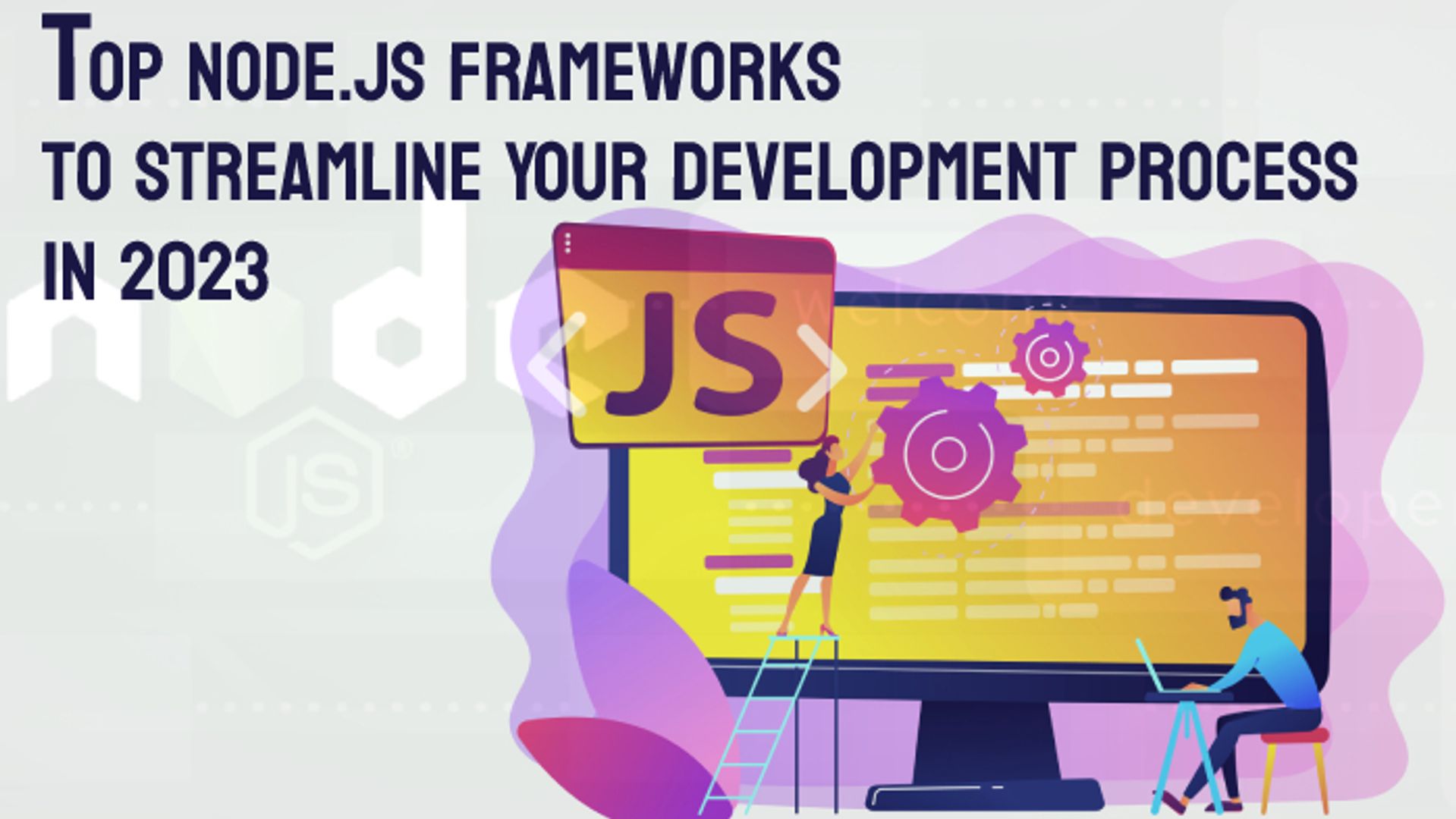As the world moves deeper into digitally driven solutions, businesses are relying more and more on web development frameworks for their IT solutions. Node.js is an open-source JavaScript runtime that's been optimized to execute server code and has become one of the most popular programming languages since its release in 2009. It quickly established itself as a go-to language for developers looking to create powerful web applications in short amounts of time without sacrificing user experience.
Out of all Node.js frameworks, here we explore the top 10 Node.js frameworks that promise to boost your team’s productivity and help you streamline your development process this year.
What are Node.js frameworks?
Node.js frameworks are libraries of code that help developers quickly create powerful web applications for their clients. By leveraging a library of pre-written and tested code, Node.js frameworks can save time and money for teams who need to rapidly build reliable software solutions.
There are three categories into which the Node.js frameworks may be divided:
MVC frameworks
Model View Controller, often known as MVC, is an architectural anatomy that serves as the basis for developing adaptable frameworks and enables developers to individually define each application layer.
REST API frameworks
REST API framework offers a ready to use interface, which helps developers save time, effort, and money. Frameworks for REST APIs can be used to provide dependable client-server communication channels.
Full-stack MVC frameworks
Full-stack MVC frameworks offer a variety of tools for creating and maintaining software as well as support and manage the frontend and backend development of a mobile app.
What are the top 10 Node.js frameworks?
1.Express.js
Express.js is a lightweight web application framework that allows developers to rapidly build robust APIs and web servers with JavaScript. This framework was designed for building single-page, multi-page, and hybrid applications with Node.js. It provides an incredibly reliable way to create APIs and it's extremely lightweight, making it easy to maintain and scale applications over time. With Express.js, developers can quickly create dynamic routing and middleware for their applications, which helps them create easily maintainable codebases with minimal effort.
Features
- It enables advancements in the immediate API's integration.
- It ensures the development of server-side tools.
- The speed and quality of the development process is impressive.
2.Hapi.js
Hapi.js is a versatile and extensible web application framework that allows developers to build applications quickly and easily. It offers robust features such as built-in caching, intuitive plugins system, server monitoring, authentication, security protocols and much more. It is also one of the most popular Node.js frameworks with over 25 million downloads since its release in 2011. It is suitable for creating websites as well as large-scale enterprise applications. Developers who want to create modern web apps should consider using Hapi.js due to its scalability and flexibility.
Features
- There are several built-in extensions included.
- The work is made simpler by the plugins' strong support.
- The use of secure defaults incurs minimal overhead and ensures ongoing support for the developer.
- Helps with fast and easy big fixing
- It works with databases like MongoDB, MySQL, and others that are comparable.
- You may obtain the standard input validation and authentication using it.
3.Total.js
Total.js is a powerful, comprehensive framework for creating websites and Node.js applications. It provides developers with an extensible platform that makes it easy to create multi-user web applications without any prior knowledge of JavaScript or Node.js. It also supports both client and server technology stacks, including HTML5, CSS3, JavaScript and more. Total.js allows developers to quickly create secure websites with user authentication as well as real-time data synchronization between the clients and servers with minimal effort.
Features
- A NoSQL database is a feature of Total.js that speeds up application development.
- Simple Mail Transfer Protocol and a Modular Coding Structure are among the characteristics of Total.js.
- Total.js allows for full front-end development and integrates with a number of database systems, including MongoDB, Angular, MySQL, Ember, and others.
4.Sails.js
The Sails.js MVC (model-view-controller) framework for Node.js upholds the "convention over configuration" concept. The finest Node.js backend development framework is this one. This framework, which draws influence from the well-known Ruby on Rails web framework, allows you to easily construct REST APIs, single-page apps, and real-time (WebSocket's-based) apps. It makes extensive use of code generators, which enable you to construct applications with little to no coding—especially for routine tasks that may be scaffolded.
Features
- It is powered by Express.js.
- It offers real-time support for WebSocket's.
- It adheres to the maxim "convention over configuration."
- The usage of Blueprints gives it powerful code generation skills.
- It is database agnostic because of its powerful Waterline ORM/ODM.
- It permits many data stores inside a single project.
- It has a lot of evidence.
5.Meteor.js
The framework solely employs JavaScript and is entirely language specific. It functions as an open-source database to a Framework that is capable of automating client modifications without the involvement of developers. According to the research, 30,046 active websites are still utilizing Meteor, and about 75,303 websites are Meteor customers. Additionally, it works smoothly with the Android operating system.
Features
- Enables rapid building prototypes using command-line interface (CLI).
- It stands out because of its potential for obtaining extremely quick interactions and its simple connection with other frameworks. Solution is more accessible to even inexperienced developers because of its simple connection with various frameworks.
- With Meteor.js, you may access the open-source Framework and a large amount of community assistance.
6.Nest.js
Create scalable and efficient server-side apps by combining TypeScript and the Node.js framework Nest.js. The main support for this web application is provided by robust HTTP server frameworks like Express or Fastify. Nest not only replicates earlier Node.js frameworks but also improves upon them. When beginning a new Node.js project, Nest.js is a far better choice than Express.js since it is built using a straightforward, clear design (controllers, modules, and providers). Consequently, dividing apps into microservices is simple.
Features
- Designing Monoliths and Microservices was made simpler using Nest.js.
- It is simple to comprehend, apply, and employ.
- It uses a strictly typed language, a bundle of JavaScript, and TypeScript.
- A robust Command Line Interface (CLI) that makes programming simpler and more productive.
7.Adonis.js
Adonis.js is a fully featured MVC web development framework that supports the Node.js environment. This framework is built on the principles of Model-View-Controller (MVC) and is designed to meet the needs of modern web applications. It has been used by many top companies, such as PayPal, Netflix, and Microsoft, for building their sophisticated apps. Adonis.js makes use of powerful server technologies, such as its own HTTP Server as well as Express and Fastify servers, to provide an efficient development experience for developers.
Features
- By offering consistent ecosystems, Adonis.js saves developers time while choosing various packages.
- Working quickly on already-existing projects is possible using Adonis.js.
8.Socket.IO
An event-driven JS library for real-time web applications is socket.IO. It makes it possible for web apps and servers to communicate in real time and in both directions. A client-side library for the browser and a server-side library for Node.js make up the two components of Socket.IO. Developers are familiar with Socket.IO since it guarantees correctness and expedites the creation of apps. The library also comes with a simple API that works well with any service.
Features
- Anomaly detection and auto-correction are just a couple of the things Socket.io can help with.
- A bidirectional data flow between the server and the web is made possible with the aid of socket.io.
- Developers may transmit clear streams from the server to many browsers using Socket.io.
9.Feather.js
The well-known JavaScript Framework enables versatility with Node.js and React native for backend development. It is compatible with the Node.js Microservices Framework and several databases. For developers, real-time functionality is a huge convenience. Additionally, it can make it easier to quickly fix bugs when developing mobile and web apps. Nevertheless, the program's creators are constantly using it to decode it in a clear and understandable way.
Features
- The implementation, connection, and communication may all be done using the extremely lightweight framework.
- Amazing support is provided through automatic RESTful API.
- The developers are suitably guided by the default authentication and authorization plugins.
10.Derby.js
This open-source framework is used for Node.js and allows developers to produce real-time, concurrent applications using a modern web technology stack. This full stack framework mainly targets the development of single page applications, which are built entirely on the client side. Derby.js comes with all of the features you'd expect from a contemporary web application such as live editing, data synchronization between clients and servers, user authentication, and much more.
Features
- Code communication between the client and server.
- Package management and hosting.
- Sharing code between the client-side and server-side platforms.
Conclusion
Node.js frameworks are an effective tool to help streamline development processes and optimize your workflow. By utilizing the various frameworks available, you can create scalable projects and ensure that all code is up to date. It is important to weigh your options when considering which framework best suits your project’s needs before deciding on one. Doing so will help you meet the demands of modern web applications while ensuring a seamless user experience. By picking one of the top 10 Node.js Frameworks for 2023, you can be sure to have an enjoyable development process and innovative results in no time!


